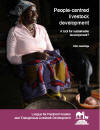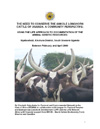People-centred livestock development: A tool for sustainable development?

Ellen Geerlings
People-centred livestock development builds on livestock keepers’ own initiatives and efforts, while helping them to use the best of both local and outside knowledge and resources. This literature review summarizes and analyses the experiences of 16 projects and organizations in Africa, Latin America and Europe that use such approaches.
Geerlings, Ellen. 2010. People-centred livestock development: A tool for sustainable development? League for Pastoral Peoples and Endogenous Livestock Development. Ober-Ramstadt, Germany.
Download 704 kb
Pakistan floods threaten livelihoods of livestock keepers

The floods in Pakistan have decimated stocks of animals, says Abdul Raziq Kakar, president of the Pakistani NGO SAVES. It is vital for people’s livelihoods to save as many animals as possible, and to help farmers and livestock keepers restock their herds.
“Every animal we save is a productive asset that poor families can use to rebuild their lives when the floods finally pass. The main priority and challenge is to get feed to those animals that have survived as much of the country’s traditional animal feed straw and forage has been lost in the floods”, says Abdul Raziq. “For buffalo and cattle, it is essential to enable the herds to rebuild quickly during the next breeding season. It is also imperative to get medicines to animals that have fallen weak or sick because of the disaster.”
Download Abdul Raziq’s report “Floods, river Indus and the local livestock breeds in Pakistan”
Ugandan cattle keepers document their breed

Ankole cattle in southwestern Uganda are well-known for their massive horns. Now this breed has been documented by the people who keep it for the first time.
Elizabeth Katushabe of the Pastoral and Environmental Network in the Horn of Africa (PENHA) coordinated the documentation effort, in collaboration with LPP and the Local Livestock for Empowerment (LIFE) Network. The resulting book is available in English and Kinyankole, the local language.
Katushabe, E. 2009. The need to conserve the Ankole Longhorn cattle of Uganda: A community perspective. Pastoral and Environmental Network in the Horn of Africa (PENHA), League for Pastoral Peoples and Endogenous Livestock Development (LPP) and the LIFE Network.
- Go to the previous page
- 1
- …
- 45
- 46
- 47
- 48
- 49
- 50
- 51
- …
- 87
- Go to the next page
